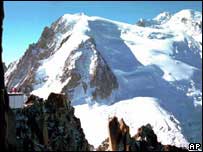European temperatures continue to rise
The new report by the European Environment Agency (EEA) recommends that Europe is facing the most severe weather changes in the last 5,000 years.

Mont Blanc, Europe's highest mountain
The average temperature of Europe is increasing much faster than the global average temperature.
The last three years have been the hottest three years in history. Only in the last century of Europe has increased nearly 1 degree C. This number seems small but it is 35% higher than the global average temperature and start to cause alarming consequences.
Ice sheets are melting in the north, in the south the drought is making the desert widen. In the summer of 2003 alone, about 10% of ice in the Alps had melted.
Europeans are consuming natural resources twice as much as the world average. Jacqueline McGale, director of the European Environment Department, said: "By the end of this century we will witness the departure of most glaciers in the Alps." "And more importantly, we lose a valuable source of pure water in the heart of Europe."
Many Europeans live longer and live alone, so the demands on the environment increase. But that is becoming more and more difficult.
- Summer temperatures will continue to be higher in the next 50 years
- Bad scenario in 2060
- Global temperatures rise, what will happen?
- The EU is still 'thinking' about e-commerce
- The amount of CO2 will reach a record in the future
- Increased temperatures make migratory birds late
- Sea level will rise by 0.9m in the next 80 years, millions of people will be displaced
- 'Eastern monsters' kill 10 Europeans: Where did they come from?
- Europe sinks in the snow and ice between
- Seawater affects global temperatures
- Global temperatures rise to an alarming level
- The scary of climate change: The coldest animals cannot live anymore
 Is the magnetic North Pole shift dangerous to humanity?
Is the magnetic North Pole shift dangerous to humanity? Washington legalizes the recycling of human bodies into fertilizer
Washington legalizes the recycling of human bodies into fertilizer Lightning stone - the mysterious guest
Lightning stone - the mysterious guest Stunned by the mysterious sunset, strange appearance
Stunned by the mysterious sunset, strange appearance